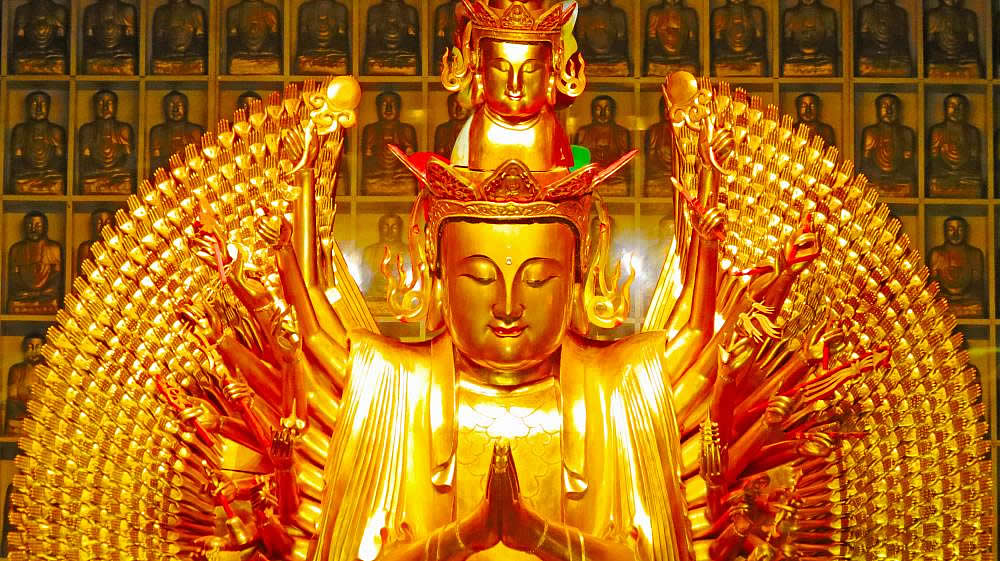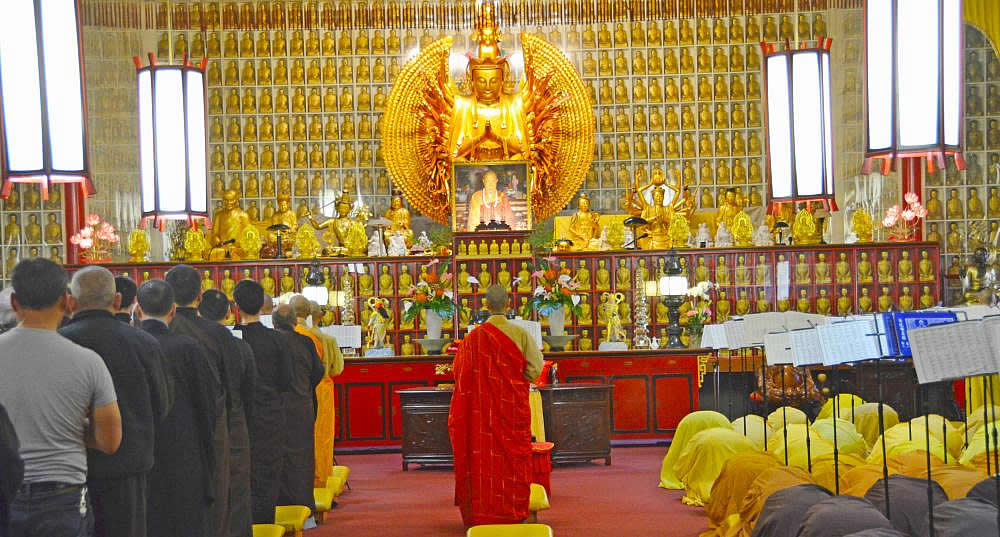 |
|
When the Madness in Your Mind Stops,
It Is Just Bodhi

A Talk given by Bhikshuni Heng Yi (比丘尼恆異), October 20, 2016
All Buddhas, Bodhisattvas, Venerable Master, Dharma masters, and all Dharma friends, good evening. Tonight is Heng Yi’s turn to tie Dharma affinity with everyone.
This week, there is no school for the University (DRBU), so that all students, faculty and staff can concentrate on the session. Last week, I and another Dharma master discussed what assignment we wanted to assign to our students, and the assignment was meant to evaluate students’ experience with the session. I suggested we ask students to contemplate on the following sentence from the Shurangama Sutra:
“Thus the madness in your mind that is like Yajñadatta’s madness will cease of its own accord, and just that ceasing is enlightenment.”1
We asked students to use one of the practices suggested in the Shurangama Sutra to achieve that goal, and delve into this line and jot down some observations of how their practice evolves over the session. Because I don’t have teaching duty this week, I decided to work on the same assignment that we assigned to students. At the end of today’s talk, I will share my own reflection. Apart from that, I also want to share three stories with you tonight.

Last year, a Dharma master from Vietnam came to attend the 10,000 Buddhas Repentance bowing. She was probably very sincere. One day, while bowing, she saw an incredibly supreme brilliance emit from between the eyebrows of the Guan Yin Bodhisattva] statue behind me. The light shone upon everyone in the Buddha Hall, omitting none. Seeing this, this guest Dharma master was so delighted that she wished to see that light again. So she made a request to Guan Yin Bodhisattva, “I’d like to see that light again. Could you please fulfill my wish?” Then another bhikshuni, a CTTB nun, just finished her work at the Rebirth Hall and came into the Buddha Hall from the back door. She entered the assembly and stopped at the bowing cushion two spaces away from this guest Dharma master. Immediately, she saw another ray of light put forth from between Guan Yin’s eyebrows. That ray of light did not stray to the side, but directly shone upon that bhikshuni who came in late. This made that guest Dharma master very envious. She said to Guan Yin Bodhisattva, “That is just a hair's breadth away from me. Guan Yin! Why her, not me?”

Before the Buddhas speak the Dharma, they will emit light from different parts of their bodies. Not only Buddha can emit light, basically, each of us emits light as well. In particular, when we are reciting mantras, Buddhas’ and Bodhisattvas’ names, our bodies and heads emit light. Then, when does our light go off? Let me share another story with you.
Tiger SpiritThere was an [a very] influential scholar of the Qing Dynasty in China. His name is Ji Xiaolan. His mother used to hire a cook who told the following story. This story was collected in one of Ji Xiaolan’s works. In the cook’s hometown, one day a poor man went out to beg for food. When night fell, he got lost and couldn’t find his way home. He sat under a withered tree, waiting to set out again at daybreak.
All of a sudden, a man came out of the woods, followed by four attendants. Each of them was tall and husky. Scared, the beggar knelt down and begged for mercy. That man showed sympathy for him and said, “Don’t be afraid. I won’t take your life. I am a tiger spirit who takes charge of tigers. I am here to coordinate food for all tigers. After a while, you’ll see a tiger eating people. After that, you can take the clothes of the deceased and keep them for yourself. That should be able to help sustain your life.”
Having finished these words, the tiger spirit gave a long, loud whistle, then many tigers gathered together from all directions waiting for his orders. The beggar heard all the instructions the tiger spirit gave to the other tigers, but he understood none of them. Later, all tigers left; only one tiger stayed behind. It hid itself in the bush. Not long, a man carrying a bundle on the pole passed by. The tiger pounced on the man, but turned away and ran the other direction almost at the same time. The man fled quickly.
After a while, a woman came by. The same tiger quickly came out again and devoured her. The tiger spirit came over and took out some money from her clothes and handed [it] over to the beggar. He explained the situation to the beggar, “Tigers do not eat people. They eat only beasts. Tigers will only eat those who have a human form but lack a human heart. In general, as long as a person has conscience, there must be an aura above his head. When tigers see the aura, they definitely will not harm that person. However, if a person’s conscience is completely gone, the aura above his head will also completely go off. At that time, this person is no different from a beast. Therefore, tigers can take advantage of him and eat him.

Tiger spirit continued, “Although the man who carried a bundle on the pole was fierce and irrational, after his brother passed away, he took upon himself the responsibility for taking care of his widowed sister-in-law and nephew, so that they won’t suffer the hardships of hunger and cold. Because of that single thought of kindness, although his aura was as tiny as a bullet, that tiger dared not eat him.
The woman who came by later abandoned her husband and married another man. Besides, she abused her step-son and often beat up the boy until he was black and blue all over. On top of that, she even stole her 2nd husband’s money and gave it to her own daughter. Therefore, the aura above her head was completely gone, and the tiger was able to eat her. The money I took out of her pocket was the money she stole from her husband. When tigers see people who are beasts in human clothing, they definitely will not let them go.
As for you, you look after your step-mother and always serve her with limited food before yourself. The aura above your head is over a foot high! I helped you for that reason, not because you knelt in front of me and begged for mercy. Therefore, you should continuously cultivate wholesome deeds. More blessings will come your way.
After the tiger spirit finished his words, he showed the beggar the way to go home. The beggar followed his instructions and walked for one day and one night and finally arrived home. This story reached and transformed many hearts and many people became kind.
Let’s think over this story: by cultivating worldly good deeds, one can emit light, and even tigers would not encroach on him. How much more can we emit light when we cultivate transcendental goodness? When reciting Guan Yin Bodhisattva’s name, we are cultivating transcendental goodness. The tigers mentioned in this story can be likened to our ignorance, afflictions, and deluded thoughts. When the light of our bodies go off, this opens up an opportunity for them to trouble us.
A Buddha is standing within the recitation of the Buddha’s nameA certain laywoman has the habit of reciting Buddha’s name and reciting sutras. She also has practiced morning and evening recitation on a daily basis for several decades. One day, she learned a very influential gang leader was to be shot by a death squad. Before he was escorted to the execution site, she saw this man on the television screen. All of a sudden, she had a feeling: “Whoever is sent to be executed would usually be very scared, how come this man could remain calm and undaunted?” Besides, many people were bowing to him on the sides. Seeing this, she felt very bad for him.
Before this, it was said that this man even drew Guan Yin’s image while he was jailed, and his drawing was said to be very delicate and exquisite. She thought this man who was condemned to death must be very talented. It must be that with one wrong move, he ended up like this. At that time, she made a small vow: since I have the habit of reciting Buddha’s name and sutras everyday, why don’t I make a dedication to him?
As a matter of fact, this woman did not know that man. She just saw him on the television. Therefore, she wondered if he could get the transferred merits she sent to him.
After she had done the dedication for three days, she had a dream. In her dream, she was reciting Buddha’s name and sutras, then the executed man appeared. The man was accompanied by two men. The two men were in ancient dress, whereas he himself was in his normal clothes. When this man saw her, he bowed to her immediately. She thought: how could I deserve this? Then she stood up right away. The man said, “Ma’am, I am not bowing to you. I am bowing to your Buddha, because Amitabha Buddha is standing right within your recitation. Your dedication to me is much appreciated.”
Astonished, the woman asked him, “Did I really help you? I don’t know you at all. Did you get my dedication?”
“Oh, sure, and it’s very helpful,” the man said, “I committed offenses in the world of the living and had gone through the trial. After my execution, I am currently going through the second trial in the nether world. Fortunately, you are reciting sutras for me, which mitigated my offenses.”
I think this executed offender must either be a transformation body of Buddha or Bodhisattva, or had affinities with the Three Jewels. He not only could draw Guan Yin, but also knew to bow to Amitabha Buddha. After he died, a stranger attempted to save him with Buddha-dharma. Having read this story, I feel consoled. I also have the habit of dedicating merits gained from daily practices to people, no matter if I know them or not. I used to doubt if they received the benefits or not? The woman in this story made dedication to a person she had never met before, and the recipient could see Amitabha Buddha standing within her recitation. Our dedication goes as far as our mind can reach. It is thus evident that if we dedicate the merit from reciting [the holy name of] Guan Yin Bodhisattva to others, we should be able to deliver Guan Yin’s compassion to those in need as well.
Over the past few years, I found I am mentally drained from too much brainwork. I found it increasingly difficult to concentrate when I am doing Buddha Hall practices. Instead of saying that the habit of staying focused is fading, I might as well say that the habit of letting go of attachment has not yet developed. In cultivation, no matter what practice we engage in, we must develop concentration to start with. The reason why we cannot concentrate is because we haven’t acquired the skills to unfasten ourselves. There was an old bhikshuni who had been meditating for over 30 years. When asked, “Dharma Master, when you’re sitting in meditation, what skills do you apply?” She replied, “Throughout my life, I have been practicing “letting go of everything.”
We might need to spend our whole life or even several lifetimes to practice detachment, this is because it is not something that can be easily accomplished. Our minds might want to and our mouth might say so, and even though we might be able to detach from things at a coarse level, we still cling to subtle attachments. What is the reason for this? The reason is very simple—we are not strong enough in our cultivation to enable us to make it.
When you want to concentrate but you find it difficult to gather your thoughts; when you want to cultivate, you find it difficult to apply your skills. All kinds of thoughts come into conflict with each other. At that time, you still need to adhere to your recitation. Keep listening to your own recitation, to the point that your whole being becomes one with Guan Yin. Because you don’t know when your spiritual skills will manifest, you need to stay steadfast in your practice. You have to bear what you find unbearable, endure what is hard to endure, and let go of what you cannot relinquish. The foundation and power of concentration are established when you have developed untiring perseverance in your efforts.
This week, I am doing the same homework as my students. I can confirm that our minds can be trained. Through training, I can shorten the time when I am having deluded thoughts; I can also prolong my concentration. When I was able to loosen my grip on my thoughts, I was able to merge myself into the collective recitation and follow along the rhythm of the chanting of the great assembly.
“When the madness in your mind ceases, that ceasing itself is enlightenment.”
If you have not perfected your skills this time, you are welcome to come back and continue your practice next time.
A few days ago, a Dharma master announced that we will begin our back project (IIP&E) next year. If you care about a thriving future for the City of Ten Thousand Buddhas and wish to have a larger space for cultivation, you are encouraged to dedicate the merits from your practice in this session. Guan Yin Bodhisattva answers all sincere requests. Amituofo.
1. https://www.cttbusa.org/shurangama/shurangama15.asp.html (Chapter 4 of Shurangama Sutra)
Editor’s Note:
The Venerable Master said the City of 10,000 Buddhas is a monastery under the protection of Guan Yin Bodhisattva. The Guan Yin Bodhisattva statue at the CTTB is the work by 王泰生 Wang Tai Sheng, a master sculptor of Buddhist images in wood. In addition to the one at the CTTB, currently, six such statues exist in the world. Two are in Canada, one in Hong Kong, and three in Taiwan:
- Gold Buddha Monastery, Vancouver, Canada
- International Guanyin Sagely Buddhist Monastery, Richmond, Canada
- Guan Yin Monastery (Kwun Lam Temple) 港大嶼山觀音寺, Lantau Island, Hong Kong
- Pu-Li Buddha’s Light Monastery 埔里佛光寺, Taiwan
- Xizhi Ci-Hang Guan Yin Temple 汐止慈航堂觀音殿, Taiwan
- Cheng-Tian Chan Monastery, Guan Yin Temple, 承天禪寺觀音殿, Taiwan
Source: http://www.drbachinese.org/vbs/publish/539/vbs539p029.pdf (article in issue 539 of Vajra Bodhi Sea, April 2015, pp. 29–31)